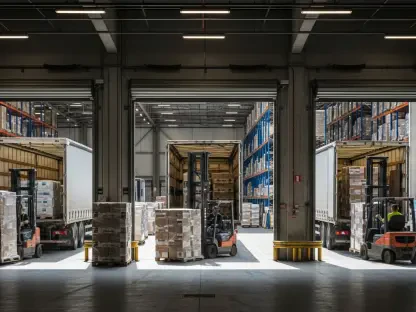What happens when two logistics giants unite to tackle the world’s most pressing supply chain challenges? Picture a world where complex freight moves seamlessly across continents, even in the harshest environments, powered by a blend of specialized expertise and vast global reach. The recent acquisition of Pentagon Freight Services by JAS Worldwide, announced on August 1, 2025, is not just a business deal—it’s a potential game-changer for an industry under constant strain. This partnership promises to reshape how businesses navigate the intricacies of global trade, setting a new benchmark for efficiency and innovation.
The significance of this merger cannot be overstated in a logistics landscape battered by disruptions, from geopolitical tensions to unprecedented demand for specialized transport. With Pentagon’s 50-year legacy in handling high-stakes freight and JAS’s extensive international network, this alliance is poised to address critical pain points in the sector. It’s a strategic move that reflects a broader trend of consolidation, where combining strengths is essential to staying competitive. Let’s explore how this collaboration could redefine standards and deliver real value to stakeholders worldwide.
A Game-Changing Alliance in a Fast-Moving World
The union of Pentagon Freight Services and JAS Worldwide marks a pivotal moment for global logistics. Announced earlier this month, the acquisition brings together a veteran freight forwarder known for tackling tough challenges and a powerhouse with an expansive operational footprint. This isn’t merely about expanding market share; it’s a calculated step toward solving the complex demands of project-based freight in industries like energy, where precision and reliability are non-negotiable.
What sets this partnership apart is the synergy of vision between the two entities. Pentagon, with its deep-rooted experience, has carved a niche in managing intricate shipments in remote and challenging regions. JAS, on the other hand, offers a robust infrastructure that spans multiple continents. Together, they aim to create a logistics force capable of handling the most daunting tasks with unmatched efficiency, potentially transforming how critical goods move across borders.
The timing of this merger couldn’t be more critical. As supply chains face relentless pressure from global uncertainties, businesses are hungry for solutions that combine speed, scale, and specialized know-how. This alliance could serve as a blueprint for how strategic partnerships can address systemic issues, offering a glimpse into a future where logistics isn’t just reactive but proactively innovative.
Why This Merger Matters in Today’s Logistics Landscape
Global logistics stands at a crossroads, grappling with challenges that test even the most established players. Supply chain disruptions have become the norm, with a recent study by McKinsey indicating that 87% of companies faced significant delays in 2024 due to unforeseen global events. Add to that the rising complexity of geopolitical barriers and the urgent need for tailored freight solutions, and the industry’s need for transformation becomes clear. The Pentagon-JAS merger arrives as a timely response to these pressures.
Pentagon’s expertise in energy logistics, honed over decades, complements JAS’s ability to operate at scale across diverse markets. This isn’t just a union of resources but a fusion of capabilities designed to meet escalating demands. Industry consolidation, as seen in this deal, is increasingly viewed as a pathway to resilience, with data from Deloitte suggesting that merged logistics entities often see a 15% uptick in operational efficiency within two years. For clients, this could translate into faster delivery times and more reliable service in an unpredictable world.
Beyond numbers, the merger signals a shift in how logistics firms position themselves against global challenges. It’s a recognition that solo operations may no longer suffice in addressing the multifaceted needs of modern trade. Stakeholders can expect this alliance to push boundaries, potentially setting new standards for handling specialized freight while navigating the turbulent waters of international commerce.
Breaking Down the Pentagon-JAS Partnership
At the core of this strategic acquisition lies a blend of complementary strengths that could elevate the logistics game. Pentagon operates 65 offices worldwide with a workforce of 1,200, focusing on complex freight in demanding environments. JAS brings to the table a vast network that amplifies reach and resources. Their shared commitment to client-centric growth forms a solid foundation for integration, ensuring that the merger isn’t just about size but about smarter operations.
A key highlight is the expanded global coverage this partnership offers. Clients in high-stakes sectors like energy stand to benefit from a wider array of services, accessing solutions that combine Pentagon’s niche expertise with JAS’s infrastructure. Leadership from both sides has emphasized a smooth transition, promising “business as usual” as the deal progresses toward closure later this year. This focus on continuity aims to reassure existing customers that service quality remains a top priority.
Innovation is another cornerstone of this alliance. By merging Pentagon’s ability to manage tough logistics challenges with JAS’s technological and operational scale, the partnership is positioned to redefine benchmarks in project logistics. Whether it’s transporting critical equipment to remote oil fields or coordinating multi-country shipments, the combined entity appears ready to tackle tasks that once seemed insurmountable, potentially influencing industry practices on a broader scale.
Voices from the Frontline: Insights and Expectations
Feedback from within the ranks paints a picture of optimism about this merger. Pentagon’s leadership has voiced excitement, stating, “Joining forces with JAS Worldwide unlocks incredible avenues for growth and enhanced service, aligning perfectly with our long-term ambitions.” This sentiment reflects a belief that the partnership will not only expand capabilities but also elevate the quality of solutions offered to clients across various sectors.
Industry experts share similar enthusiasm, with recent analyses suggesting that logistics mergers often drive significant efficiency gains—sometimes up to 20% in the first 24 months. Employees at a key Pentagon hub have also shared stories of anticipation, highlighting how access to JAS’s advanced tools could simplify previously daunting projects. One worker noted the potential to streamline operations for a major energy client, a task that once required weeks of manual coordination.
These diverse perspectives underscore a collective hope that this isn’t just a corporate transaction but a catalyst for meaningful change. The blend of leadership vision, analytical data, and ground-level excitement suggests that the merger could resonate beyond immediate stakeholders, influencing how logistics firms approach growth and collaboration in a competitive arena.
Navigating the Future: What This Means for Stakeholders
For businesses and clients tied to global logistics, the Pentagon-JAS alliance offers a roadmap for adaptation in a shifting industry. Enhanced service offerings are on the horizon, particularly for those in energy and project-based sectors, as the merged entity integrates its capabilities. Keeping an eye on these developments could reveal opportunities to streamline operations or access new markets with greater ease.
Staying updated on the transition is equally vital. With final approvals pending for later this year, monitoring operational updates or changes in contact points will help ensure uninterrupted service. Competitors, too, should take note—this merger may prompt industry-wide innovation, potentially affecting pricing structures or service models. Proactively reassessing logistics strategies in light of such shifts could be a prudent move.
Engaging directly with the new entity presents another practical step. Reaching out to understand how the combined strengths can address specific challenges—whether it’s navigating remote regions or scaling shipments—could unlock tailored solutions. This merger serves as a reminder that the logistics landscape is evolving rapidly, and active participation is key to leveraging emerging opportunities for growth and efficiency.
Looking back, the journey of Pentagon Freight Services and JAS Worldwide toward this historic merger revealed a shared determination to confront global logistics challenges head-on. Their commitment to blending specialized expertise with expansive reach laid a foundation for what became a transformative alliance. As the integration unfolded, it was clear that their focus on stability during transition reassured stakeholders, fostering trust amid change. Reflecting on this milestone, it’s evident that their collaboration set a precedent for innovation. Moving forward, businesses should prioritize staying informed about the merged entity’s evolving services, explore partnerships that enhance their own logistics frameworks, and remain adaptable to industry trends sparked by such bold consolidations.









